|
|
|
Sort Order |
|
|
|
Items / Page
|
|
|
|
|
|
|
| Srl | Item |
| 1 |
ID:
131794
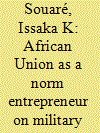

|
|
|
|
|
| Publication |
2014.
|
| Summary/Abstract |
Between 1952 and 2012, there were a total of 88 successful military coups in Africa. Of those, 63 occurred prior to 1990, and 10 cases since the adoption, by the defunct Organization of African Unity (OAU), of the Lomé Declaration in July 2000, banning military coups and adopting sanctions against regimes born out of this. The article shows that the African Union (AU) has followed in the footsteps of the OAU in this regard. Assisted by some African regional organisations and international partners, the combined effect of this policy of the AU - assisted by other factors - has been a significant reduction in the occurrence of this phenomenon. While not constituting a funeral arrangement for military coups in the immediate future, these developments - if they were to continue - may indeed make this eventuality achievable in the long run. But the article also reveals some challenges the AU is facing in ensuring this.
|
|
|
|
|
|
|
|
|
|
|
|
|
|
|
|
| 2 |
ID:
160359
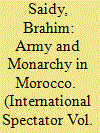

|
|
|
|
|
| Summary/Abstract |
The study of the complex relationship between army and monarchy in Morocco provides support for the argument that coup-proofing and institutionalisation enable civil leadership to enhance and maintain civilian control over the military. Through a strategy of coup-proofing implemented by the monarchy to protect itself from coups d’état, the army had been depoliticised. Through institutionalisation the Moroccan army is now governed by a clear set of constitutional and legal norms, principles and procedures with a system based on meritocracy. This approach is helping to stabilise relations between state and society and avoid power struggles between civilian leaders and the armed forces.
|
|
|
|
|
|
|
|
|
|
|
|
|
|
|
|
| 3 |
ID:
143288
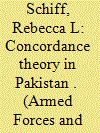

|
|
|
|
|
| Summary/Abstract |
In Zulfiqar Ali’s article regarding concordance theory in Pakistan, Dr. Ali asserts that concordance theory does not explain domestic military intervention in Pakistan. He also suggests that concordance theory superimposes a Western theoretical model on Pakistan, like Huntington’s theory of objective civilian control. In response to Dr. Ali’s claims, this article reiterates how concordance theory can in fact explain why Pakistan has suffered from domestic military intervention—the alienation of the Bengali community and subsequent lack of agreement among the three concordance partners being one significant factor. Additionally, Huntington’s theory focuses on institutional and dichotomous civil–military relations, grounded in the post–World War II US case study. By contrast, concordance theory views the relationship between military and society from both cultural and institutional perspectives and embraces those indigenous qualities that may encourage or discourage domestic military intervention.
|
|
|
|
|
|
|
|
|
|
|
|
|
|
|
|
| 4 |
ID:
165795
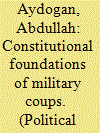

|
|
|
|
|
| Summary/Abstract |
ABDULLAH AYDOGAN argues that military coups are less likely to occur in countries with parliamentary systems. In these countries, he claims, military elites seeking to remove chief executives often select other strategies, such as threatening legislators.
|
|
|
|
|
|
|
|
|
|
|
|
|
|
|
|
| 5 |
ID:
132974
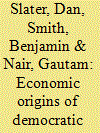

|
|
|
|
|
| Publication |
2014.
|
| Summary/Abstract |
From Aristotle to Acemoglu and Robinson, scholars have argued that democracy possesses powerful redistributive impulses, and imperils itself accordingly. We challenge the validity of the redistributive model of democratic breakdown in the postcolonial world-the only cases where democracies have collapsed since World War II-because its assumptions regarding state power are questionable or even inapplicable in postcolonial settings. Our correlative analysis of cross-sectional time series data from 139 countries between 1972 and 2007 indicates that, contrary to the expectations of the redistributive model, redistributive taxation is negatively associated with the incidence of military coups and the likelihood of democratic breakdown. Furthermore, authoritarian takeovers do not appear systematically to result in reduced redistribution from the rich. More fine-grained historical evidence from Southeast Asia-a region where the redistributive model should be especially likely to hold true-further affirms that authoritarian seizures of power are neither inspired by successful redistributive policies nor followed by their reversal. Taken together, these quantitative and qualitative data offer significant support for our central theoretical claim: contemporary democratic breakdowns have political origins in weak states, not economic origins in class conflict.
|
|
|
|
|
|
|
|
|
|
|
|
|
|
|
|
| 6 |
ID:
165972
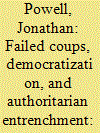

|
|
|
|
|
| Summary/Abstract |
Long maligned as the largest threat to democratization, recent studies have suggested that military coups can act as important windows of opportunity for democratization in authoritarian regimes. It is argued that even failed coup attempts can roughly double the probability that an authoritarian regime democratizes in the next three years. We revisit these findings by assessing each case of a democratic transition occurring in a failed coup spell in Africa, using the standards of prior work. Our analysis points to a more pessimistic view of the influence of failed coups. Specifically, we find that the nature of these transitions, often being drawn out over several years, and the nature of the data previously utilized to test the association undermine the ability to observe a democratizing effect. Instead of failed coups providing a significant boost to democratization, we find they are more likely to reinforce the country’s previous political trajectory. Failed coups serve incumbents with the dual benefit of both outing their opponents and providing a pretext for their removal, ultimately providing a policy boost for both democrats and autocrats.
|
|
|
|
|
|
|
|
|
|
|
|
|
|
|
|
| 7 |
ID:
158102
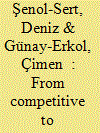

|
|
|
|
|
| Summary/Abstract |
Recent research shows that Turkish society is very polarized and that different identities and ideological perspectives are in constant struggle with each other. In a multicultural society such as Turkey’s, the question of how to think about the relationship between different social groups’ histories of victimization becomes crucial. Following Michael Rothberg’s conceptualization of multi-directional memory – beyond competitive memory, this article presents an archive for comparative work through a data set of novels on the military coups in Turkey. The major argument here is that while these novels are promoting the idea of competitive memory as a zero-sum game, if it is looked at more closely, there are traces of multi-directionality, of ongoing negotiation, cross-referencing, and borrowing. Doing so, it is argued, would help to reframe justice in the society, where different victimizations are not competing with each other, but start to talk to each other. This article is an attempt to create a literary tool of comparison on different stories of victimization as a first step towards transitional justice in a polarized society.
|
|
|
|
|
|
|
|
|
|
|
|
|
|
|
|
| 8 |
ID:
160571
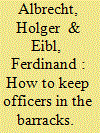

|
|
|
|
|
| Summary/Abstract |
What are the most efficient strategies to prevent military coups d’état? The answer depends on coup agency, that is, who attempts to overthrow the regime: elite officers or lower-ranking combat officers. Elite officers and lower-ranking combat officers have different incentives, opportunities, and capacities when it comes to perpetrating coups. Using original data on coup agency, public spending, and officer salaries in the Middle East and North Africa, we find that counterbalancing—a strategy designed to increase barriers for coup plotters’ coordination efforts—and higher shares of defense spending prove more effective at preventing coups by elite officers. However, higher social spending reduces the risk of coups by combat officers. Political liberalization has mixed effects on military agents. It decreases the risk of coups by combat officers, but makes elite officers more likely to mount coups. Our findings suggest that the study of coups needs to better incorporate variation and that we need to rethink the image of coups as purely elite-led power grabs.
|
|
|
|
|
|
|
|
|
|
|
|
|
|
|
|
| 9 |
ID:
105678
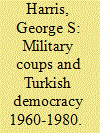

|
|
|
|
|
| Publication |
2011.
|
| Summary/Abstract |
He proclaimed, "We resemble ourselves." Nowhere is that more true than in regard to the Turkish military's role in politics. As many have pointed out, the Turkish armed forces have not behaved as a South American model might have suggested. Nor have they acted as Middle Eastern or North African military establishments would have. Instead the institution has taken a course consistent with Turkey's history and culture.
|
|
|
|
|
|
|
|
|
|
|
|
|
|
|
|
| 10 |
ID:
131458
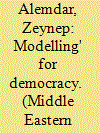

|
|
|
|
|
| Publication |
2014.
|
| Summary/Abstract |
Although Turkey has come a long way in terms of human rights since the 1980 military coup, a closer historical look inside the Turkish political scene shows us how freedom of speech was always to be sacrificed if its exercise threatened the perceived unity of the country. The article shows how decision makers' perceptions of the state as a superior institution in need of protection have shaped the practice of governing free speech in Turkey since the early years of the Republic, and introduces a unique chronology, accounting for the interaction of internal and external influences.
|
|
|
|
|
|
|
|
|
|
|
|
|
|
|
|
| 11 |
ID:
132488
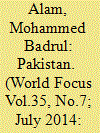

|
|
|
|
|
| Publication |
2014.
|
| Summary/Abstract |
Like in any nuclear weapon state, multiple vulnerabilities exist in a nuclear weapons complex. In the case of Pakistan, it is possible that groups or individuals may violate security rules for a variety of reasons, including pro?t making, settling a vendetta, or religious or ideological motives. Rogue elements may try to gain control over sensitive items for their own use or to transfer these items to another state or to other non-state actors for ?nancial or ideological reasons. A special concern is that of Pakistan, as its history_ suggests, may suffer another military coup at some point of time. A new leadership, in that case, can be expected to- place a high priority on seizing the country's nuclear assets
|
|
|
|
|
|
|
|
|
|
|
|
|
|
|
|
| 12 |
ID:
116306


|
|
|
|
|
| Publication |
2012.
|
| Summary/Abstract |
Fiji's post-colonial journey has been fraught, a promising beginning hobbled by political instability, periodic military coups and stagnant economic growth. Political disagreements over the best form of political representation have featured prominently in Fiji's political discourse, with no enduring resolution in sight.
|
|
|
|
|
|
|
|
|
|
|
|
|
|
|
|
| 13 |
ID:
135229
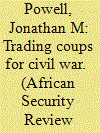

|
|
|
|
|
| Summary/Abstract |
This paper investigates civil conflict as a product of the survival strategies of African leaders. Specifically, the paper offers a theory of risk substitution that predicts coup-fearing leaders will undermine the military effectiveness of the state when making an effort to extend their own tenure. While ‘coup-proofing’ practices have often been noted as contributors to political survival, considerably less attention has been paid to the influence of these strategies on other forms of conflict. Utilising data from a number of cross-national datasets, the analyses show that having a higher number of ‘coup-proofing’ counterweights significantly worsens a state's civil conflict prospects. A brief consideration of multiple episodes of conflict further suggests that in addition to coup-proofing undermining the counterinsurgency capacity of the state, some leaders are simply indifferent to – or can even potentially benefit from – the existence of an insurgency.
|
|
|
|
|
|
|
|
|
|
|
|
|
|
|
|
| 14 |
ID:
148965
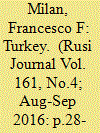

|
|
|
|
|
| Summary/Abstract |
The attempted coup that took place in Turkey on 15 July 2016 was the latest in a long line of military coups in the country’s post-Second World War history. Francesco F Milan looks at the country’s controversial legacy of civil–military relations
|
|
|
|
|
|
|
|
|
|
|
|
|
|
|
|
|
|
|
|
|